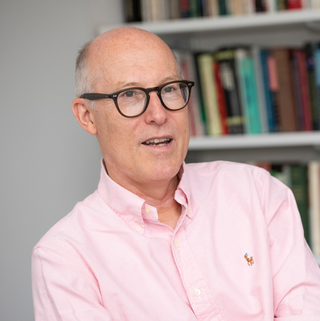
Econometrics is an application of statistical methods to economic data in order to give empirical content to economic relationships. More precisely, it is "the quantitative analysis of actual economic phenomena based on the concurrent development of theory and observation, related by appropriate methods of inference." An introductory economics textbook describes econometrics as allowing economists "to sift through mountains of data to extract simple relationships." Jan Tinbergen is one of the two founding fathers of econometrics. The other, Ragnar Frisch, also coined the term in the sense in which it is used today.
Social statistics is the use of statistical measurement systems to study human behavior in a social environment. This can be accomplished through polling a group of people, evaluating a subset of data obtained about a group of people, or by observation and statistical analysis of a set of data that relates to people and their behaviors.

Field experiments are experiments carried out outside of laboratory settings.

Kenneth George "Ken" Binmore, is an English mathematician, economist, and game theorist, a Professor Emeritus of Economics at University College London (UCL) and a Visiting Emeritus Professor of Economics at the University of Bristol. As a founder of modern economic theory of bargaining, he made important contributions to the foundations of game theory, experimental economics, evolutionary game theory and analytical philosophy. He took up economics after holding the Chair of Mathematics at the London School of Economics. The switch has put him at the forefront of developments in game theory. His other interests include political and moral philosophy, decision theory, and statistics. He has written over 100 scholarly papers and 14 books.
A Bachelor of Economics is an academic degree awarded to students who have completed undergraduate studies in economics. Specialized economics degrees are also offered as a "tagged" BA (Econ), BS (Econ) / BSc (Econ), BCom (Econ), and BSocSc (Econ), or variants such as the "Bachelor of Economic Science".
Evsey David Domar was a Russian-American economist, famous as developer of the Harrod–Domar model.

Sir Timothy John Besley, is a British academic economist who is the School Professor of Economics and Political Science and Sir W. Arthur Lewis Professor of Development Economics at the London School of Economics (LSE).

Esther Duflo, FBA is a French-American economist currently serving as the Abdul Latif Jameel Professor of Poverty Alleviation and Development Economics at the Massachusetts Institute of Technology (MIT). In 2019, she was jointly awarded the Nobel Memorial Prize in Economic Sciences alongside Abhijit Banerjee and Michael Kremer "for their experimental approach to alleviating global poverty".
David Hibbard Romer is an American economist, the Herman Royer Professor of Political Economy at the University of California, Berkeley, and the author of a standard textbook in graduate macroeconomics as well as many influential economic papers, particularly in the area of New Keynesian economics. He is also the husband and close collaborator of Council of Economic Advisers former Chairwoman Christina Romer.
Extrapolation domain analysis (EDA) is a methodology for identifying geographical areas that seem suitable for adoption of innovative ecosystem management practices on the basis of sites exhibiting similarity in conditions such as climatic, land use and socioeconomic indicators. Whilst it has been applied to water research projects in nine pilot basins, the concept is generic and can be applied to any project where accelerating change being considered as a central development objective.

The Abdul Latif Jameel Poverty Action Lab (J-PAL) is a global research center based at the Massachusetts Institute of Technology aimed to reducing poverty by ensuring that policy is informed by rigorous, scientific evidence. J-PAL funds, provides technical support to, and disseminates the results of randomized controlled trials evaluating the efficacy of social interventions in health, education, agriculture, and a range of other fields. As of 2020, the J-PAL network consisted of 500 researchers and 400 staff, and the organization's programs had impacted over 400 million people globally. The organization has regional offices in seven countries around the world, and is headquartered near the Massachusetts Institute of Technology in Cambridge, Massachusetts.
Jonathan Zinman is a professor of economics at Dartmouth College and a research affiliate at the New Haven-based research outfit Innovations for Poverty Action and the Massachusetts Institute of Technology-based Abdul Latif Jameel Poverty Action Lab. Formerly an economist at the Federal Reserve Bank of New York, Zinman is currently a visiting scholar at the Federal Reserve Bank of Philadelphia and Fellow at the Federal Deposit Insurance Corporation Center for Financial Research. Zinman is also a member of the Behavioral Finance Forum and a Research Advisory Board member of stickK, a web-based start-up that enables users to make commitment contracts in order to reach their personal goals.

Rachel Glennerster is a British economist. She is an Associate Professor of Economics at the University of Chicago. She has been announced as the new president for the Center for Global Development, starting in September 2024.

Guido Wilhelmus Imbens is a Dutch-American economist whose research concerns econometrics and statistics. He holds the Applied Econometrics Professorship in Economics at the Stanford Graduate School of Business at Stanford University, where he has taught since 2012.
Jeffrey E. Harris, is an economist and physician who has been on the faculty of the Economics Department of the Massachusetts Institute of Technology since 1977. He received an AB from Harvard University, as well as an MD (1974) and a PhD in Economics (1975) from the University of Pennsylvania. Having trained in internal medicine at the Massachusetts General Hospital (1974-1977), he maintained a medical practice at that institution until 2006. Since then, he has continued to practice as an internist at federally sponsored community health centers in Rhode Island, where the majority of his patients have poverty-level incomes and are not fluent in English.

JASP is a free and open-source program for statistical analysis supported by the University of Amsterdam. It is designed to be easy to use, and familiar to users of SPSS. It offers standard analysis procedures in both their classical and Bayesian form. JASP generally produces APA style results tables and plots to ease publication. It promotes open science via integration with the Open Science Framework and reproducibility by integrating the analysis settings into the results. The development of JASP is financially supported by sponsors several universities and research funds. As the JASP GUI is developed in C++ using Qt framework, some of the team left to make a notable fork which is Jamovi which has its GUI developed in JavaScript and HTML5.
Benjamin A. Olken is an American economist and professor at the Massachusetts Institute of Technology (MIT). Olken is one of the directors of the Abdul Latif Jameel Poverty Action Lab (J-PAL), a research centre specializing on the use of randomized evaluations for the purpose of studying poverty alleviation. His research focuses on the political economy of developing countries, especially regarding the role of corruption and the impact of interventions addressing corruption.
Tamara Ann Broderick is an American computer scientist at the Massachusetts Institute of Technology. She works on machine learning and Bayesian inference.
Eva Love Vivalt is a Canadian economist. She is currently an Assistant Professor of Economics at the University of Toronto and the director of the Global Priorities Institute at the University of Oxford.
Emily Louise Breza is an American development economist currently serving as the Frederic E. Abbe Professor of Economics at Harvard University. She is a board member at the Abdul Latif Jameel Poverty Action Lab, and an affiliated researcher at the International Growth Centre and National Bureau of Economic Research. Breza's primary research interests are in development economics, in particular the interplay between social networks and household finance. She is the recipient of a Sloan Research Fellowship.








